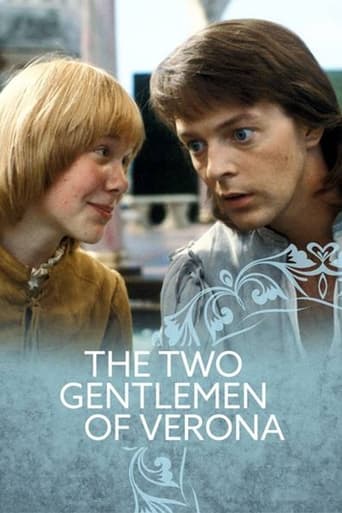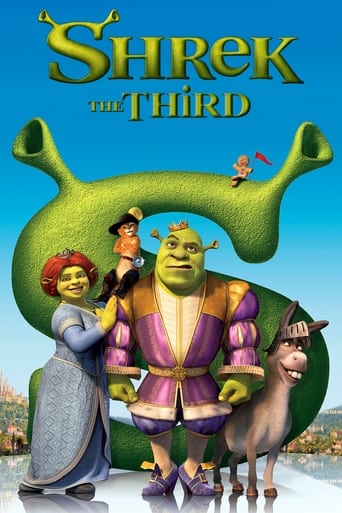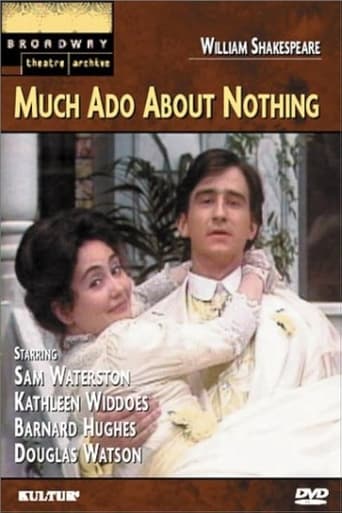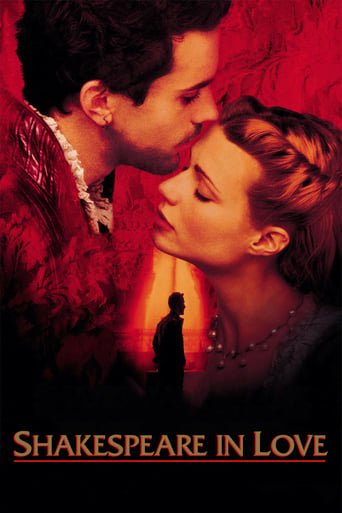The Two Gentlemen of Verona (1983)
Two great friends leave Verona for Milan, Valentine with great enthusiasm and Proteus unwillingly, as he will have to leave his recently-betrothered Julia. Valentine soon falls in love with Silvia, daughter of the Duke of Milan, but then Proteus meets the captivating Silvia... and he too becomes besotted.
Watch Trailer
Cast
Similar titles
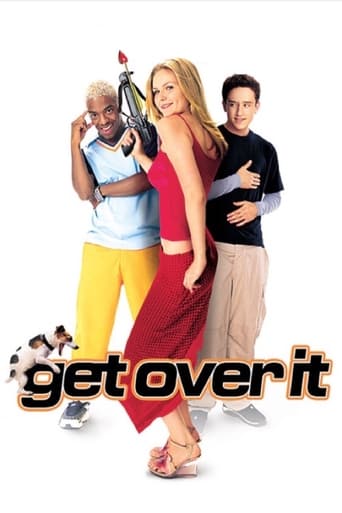
Reviews
Truly Dreadful Film
Pretty Good
A different way of telling a story
The movie turns out to be a little better than the average. Starting from a romantic formula often seen in the cinema, it ends in the most predictable (and somewhat bland) way.
"The Two Gentlemen of Verona" is one of Shakespeare's weaker plays and when I read it I thought the turn of the action was psychologically so improbable that it couldn't be pulled off credibly. However, I find the acting in this film is excellent and especially the final scene is very well done. I really enjoyed watching it. Maybe the contrition of Proteus could have been a little stronger but I think there really was a convincing show of shame and regret when the meeting with Valentine made him realize how grossly he had betrayed his friend. There is a fine balance of tragical and comical elements throughout the play and the setting is lovely. I was particularly impressed by the performance of Tony Haygarth. His Launce is funny but not exaggeratedly clownish. The play cannot even begin to compare with masterpieces like "Twelfth Night" oder "Much Ado about Nothing", but this adaptation for the screen is great.
My rating isn't for the story for which I'd give only 6 but for the gorgeous settings and good acting - how the actor could act stupid, selfish Proteus so well is worth watching by itself! I've been rewatching this wonderful series - and watching for the first time some I missed when they were shown on TV originally. The story is good enough to enjoy tho' not one of the Bard's best by any means. I really couldn't though agree with one reviewer who suggested the lines by the lovers (and therefore I suppose the whole play) should have been played for laughs because I love the language and the style and I really don't want to see any of the plays presented as complete farce. Added to which I don't find the others in the play farcical nor the story itself. The problem lies in Proteus being so intolerable immature, stupid and selfish. But I can imagine the viewer in question becoming frustrated at Proteus' persistent stupidity and wondering if farce might have helped any viewer to calm down rather than want every few minutes to give him a slap for his bad behaviour. Certainly he doesn't suffer enough at the end when he's forgiven, and that means the viewer doesn't feel much pleasure at his redemption. He doesn't seem to deserve it, nor Julia who's suffered quite enough from his ill behaviour. I wonder what her father and mother will think of all this and especially of Proteus, when she finally goes home with her regained lover? But doubtless the Duke will deal with the parents tactfully?Thank goodness Sylvia has the sense not to listen to nasty Proteus but to realise immediately that he betrayed the trust of his friend and her love. One can accept Proteus can't help his lusts and when forcibly parted from Julia, this very silly young man immediately swoons over another lovely girl who's nearby instead of afar. The worst moment is when he declares all's fair in love but in terms that are thoroughly insulting to Valentine, Julia and Sylvia too. Valentine banished behaves sensibly and shows he's worthy of Sylvia, hence the Duke forgives him for his attempt to make off with her secretly seeing that was to save her from the unwanted husband the Duke is trying to force on her. Deceitful Proteus though is far too easily forgiven by Julia even though he has hurt her over and over as she, disguised as a page, has to listen to his passionate declarations to Sylvia and dismissal of his past love. A slap across his face (or several during the play) would have done him a world of good. I suppose he's forgiven because humans can't control love - it strikes where it will as Cupid in this production demonstrates now and again. These days people expect a bit more contrition, I think. Still, the actor does his best with his moment of self-discovery and shame.So, a very satisfying production visually which makes up a great deal for Proteus being such a completely stupid and deceitful twerp and a certain lack of satisfaction at the end. Well worth watching.
The Two Gentlemen of Verona is one of Shakespeare's first plays (maybe THE first), and it is rarely seen staged, much less filmed. So this BBC production is a treat and a gem to anyone who strives to familiarize themselves with all of Shakespeare, such as myself.And I must say the production enthused me thoroughly! The set is beautiful, and I am in prostrate awe of these amazing British actors, who can say the most incredible lines, as if these words had no other proper places than on the tongues of these very trophies of the thespian muse. Some scenes were very emotional, and the actors never did flinch an inch, but performed to perfection!The page, Speed, was the best cast member (I wonder how old he was at the time), and I will also single out both Julia and Valentine for da capo performances. Proteus was perhaps a bit oafish, and a bit gay, but he, too, was up to the task and did not disparage the whole. I thought Silvia had a few slightly boring scenes, but 'tis no great matter. The "bit with the dog" (as it is called in Shakespeare In Love), however, didn't contribute a terrible lot to the story, I thought. Launce was a minor character, only thrown in to please the bawdry-craving crowd, but it's possible he would have appealed to me more, had he been presented as more integral to the action - and as rather funnier than he was here.The way the language was spoken and enacted was very lofty. Rather too lofty for a comedy, perhaps. But the good people at BBC knew what they were doing: they were paying homage to Shakespeare's words, and as such felt obliged to focus more on the words than on the theatrics. A more frivolous staging might have been seen by others as less serious and timeless, and might forsooth have been so, if the comedy were not done very well indeed.And as for the story; yes, well, we all agree that it is not Shakespeare's best. Nor his second or third best, and so on. However, is it not a preliminary study to the rest of his works!? Two Gentlemen of Verona practically overflows with thematic references to a dozen or more of the later plays! To wit: We have four lovers running afoul of each other as in A Midsummer Night's Dream. We have a woman disguised as a man, as in several later plays (well, it was a common Elizabethan theme, and would have helped the boy actors to play female parts without having to act like women all the time). We have a band of forest outlaws, almost as the Arden Forest refugees in As You Like It. We have a Friar Laurence like in Romeo and Juliet, and Julia herself is surely an early version of Juliet. We have references to Milan, Mantua and Verona, all of which recur in later plays. I dare suggest that The Two Gentlemen of Verona is not so much a play as a list of ideas for Shakespeare's subsequent comedies, possibly even written down for the express purpose of serving as cues via the which he would remember what to put into his more mature plays years later. Shakespeare was no fluke; he knew what he was doing.To address the pivotal final scene with Proteus' repentance and Valentine's forgiveness; well, Proteus' lines do seem a bit brief to warrant such instant and total forgiveness, but I think the justification for this development should be expressed in the performance, by pausing the words to let the emotion in Proteus' face speak up. Or by arranging the situation and the scenes so that it becomes more clear that Proteus' regret is utterly genuine. This production did not pull this off in a convincing way, but I'm certain it can be done. It may be difficult, but I think it must be possible.But, overall, a GREAT production! What luck that we have the BBC to bestow upon us mere mortals such absolutely impeccably and consummately professionally realized masterworks. My humble thanks.9 out of 10.
I must admit that this production of one of Shakespeare's earliest plays (if not the earliest) is beginning to grow on me. I must be losing my critical judgment.Or it may be because I have learned to filter out the rubbish spoken by the main characters, and play full attention only when the clowns Speed (in this production played plausibly as an annoying boy by Nicholas Kaby) and Launce (played by Tony Haygarth) are speaking. Launce's classic speech to his dog Crab (the only other engaging character) about the trouble Crab has brought on him is the highlight of the play.It may be that this production (the only one of this play I have seen) suffers from the seriousness which is applied to all of the productions in this BBC series of the plays. I wondered on watching it how much better it might have been if the four main characters had played their lines for laughs. The absurd reconciliations in the final scene might then have had me rolling in the aisles rather than staring in disbelief. It is hard to believe that a writer as intelligent as Shakespeare could have intended to have those lines delivered po-faced, and harder still to believe that if he did anyone would have paid him to write another play
